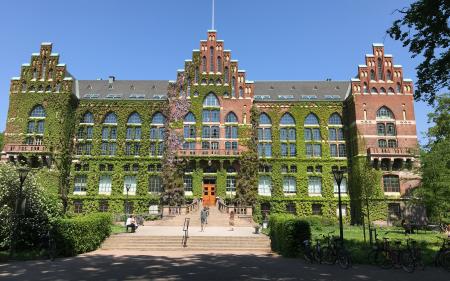Learning Opportunities
As a student in the Department of Political Science, you can take advantage of hands-on learning opportunities such as internships, community-engaged learning and undergraduate research partnerships with our internationally known faculty. Eligible students can also earn departmental distinction by writing a senior honors thesis.
Our goal is to provide you with a well-rounded learning experience that gives you the skills you need to address real-world problems.

Departmental Distinction
Are you looking for a challenging conclusion to your political science degree? Interested in graduate work or law school? Consider an honors project!
There are two routes to earning distinction in the major:
(1) a year-long thesis project (reserved for students pursing an academic graduate program)
(2) the revision of a significant course paper in the major for publication in an undergraduate academic journal
These changes are student-initiated, so if you plan on pursuing distinction in the major, consult your political science advisor about the thesis and the article project at least four quarters before graduation.
The honors thesis is open to all qualified majors with a 3.7 GPA in political science and a 3.5 overall GPA. Political science honors students must complete a total of 44 credit hours in political science coursework.
-
Why Complete an Honors Project?
If you're planning to attend either graduate school or law school, this program is highly recommended. Graduate program and law school admission committees understand and value the discipline and advanced critical thinking skills required to complete a substantial independent research project such as an honors thesis.
-
What Does an Honors Project Involve?
We now offer two student-initiated means to earning distinction in the major—an honors thesis that culminates in an oral defense of your project with your thesis advisor and two faculty committee members, or the revision of a significant course paper in the major for publication in an undergraduate journal. Talk to your political science advisor as early as possible—well before your senior year—if you are interested in either project.
-
How Do I Start the Process?
Talk to your Political Science advisor about doing an honors project.
-
Other Honors Options at DU
- You can also explore the University Honors Program.
- Learn about Latin honors at DU.
- Check out the CAHSS Dean's List and Hornbeck Scholars

Want More Information About The Honors Thesis?
Community-Engaged Learning
Political science students have many opportunities to engage with their local communities through their work at DU. In most of these instances, our faculty members partner directly with DU's Center for Community Engagement to advance Scholarship and Learning (CCESL). We are proud that a number of our students have gone on to win university-level awards that reflect their meaningful engagement and the learning that this work engenders.
Through our department, and through CCESL, students have numerous opportunities to learn from our communities and to contribute to shared projects. In political science, our students have participated in community-engaged learning through participation in:
A research methods course taught in partnership with an organization facilitating post-incarceration reentry.
Internship courses that allow students to become active learners and workers in the Colorado State Legislature, Governor’s Office, and Municipal Government of Denver.
A community-engaged learning course that involved DU students in a broader educational project in partnership with Denver's public schools.

Explore Our Global Masters Scholars Program
Complete your BA and MS in political science through coursework at DU and Lund University in Sweden



